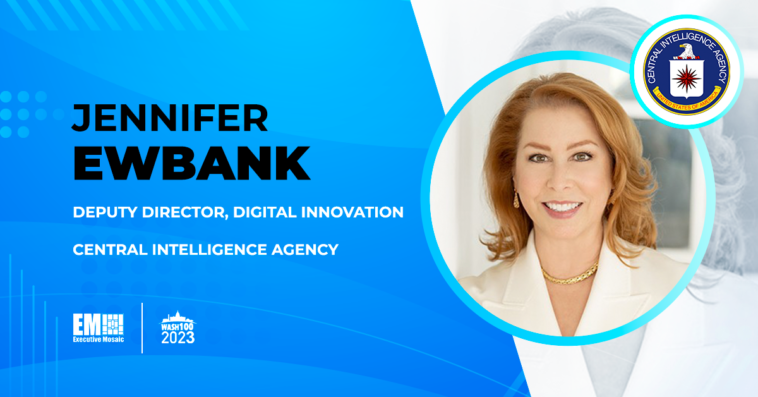At the start of 2023, the artificial intelligence industry saw a major boom with the release of numerous large language models and generative AI tools. While this new array of technologies and AI innovations seemed to unlock a new world of possibilities, it also opened up new threat vectors and potential risks.
The Central Intelligence Agency’s Deputy Director for Digital Innovation Jennifer Ewbank explained that this dichotomy in the private sector is also reflected in the United States Intelligence Community, and IC leaders are grappling with how to use these advancements to their advantage while defending against adversarial uses of AI.
“We talk about this exponential increase in data and this world of ubiquitous sensing — and all of that is… both a challenge for doing our secret mission that remains secret, but it’s also a powerful potential capability for us,” said the 2023 Wash100 Award winner in an exclusive video interview with Executive Mosaic.

Jennifer Ewbank is scheduled to keynote the Potomac Officers Club’s 9th Annual Intel Summit on Sep. 21! Join the IC event of the year and hear from top leaders at agencies like ODNI, NGA, DIA, CIA and more. Register here to save your seat.
The intelligence tradecraft has significantly evolved in recent decades as IC agencies see an increasing influx of data and the ability to glean insights from that data becomes ever more critical to intelligence missions.
“Data is not information and information is not insight,” Ewbank noted. “So how do you get from a bunch of ones and zeros to actual insight that we can use for our analytic judgments and get to policymakers or some kind of advantage for an operations officer who’s on the streets of some hostile capital somewhere around the world.”
Ewbank said she’s seeing opportunities for AI particularly in areas like foreign language translation and summarization, object detection and intelligence analysis. The next frontier of innovation will be scaling and speeding up AI capabilities.
“To do that at the speed of mission and at the scale that we’re seeing with this new, incredible deluge of data, we’re really going to have to use machines. We’re going to have to learn how to partner better with machines,” Ewbank urged.
Part of the urgency behind human-machine teaming and integration stems from our adversaries’ use of AI technologies to our detriment, Ewbank noted.
“Our adversaries are very aggressive in this space too, and we have to remember that they can weaponize and maybe occasionally are weaponizing this technology against us. We’ve seen some pretty dramatic examples of deepfakes — a very powerful form of AI — in this threat environment,” she shared.
Another trend that concerns Ewbank is that AI is “strengthening the hand” of authoritarian regimes around the world and creating “digital autocracies” that threaten our national security and should be discussed more widely.
Don’t miss Jennifer Ewbank speaking in person at the Potomac Officers Club’s 9th Annual Intel Summit! Join us on Sep. 21 for a day packed with IC insights, industry expertise and networking opportunities. Register here.




